- Latest articles
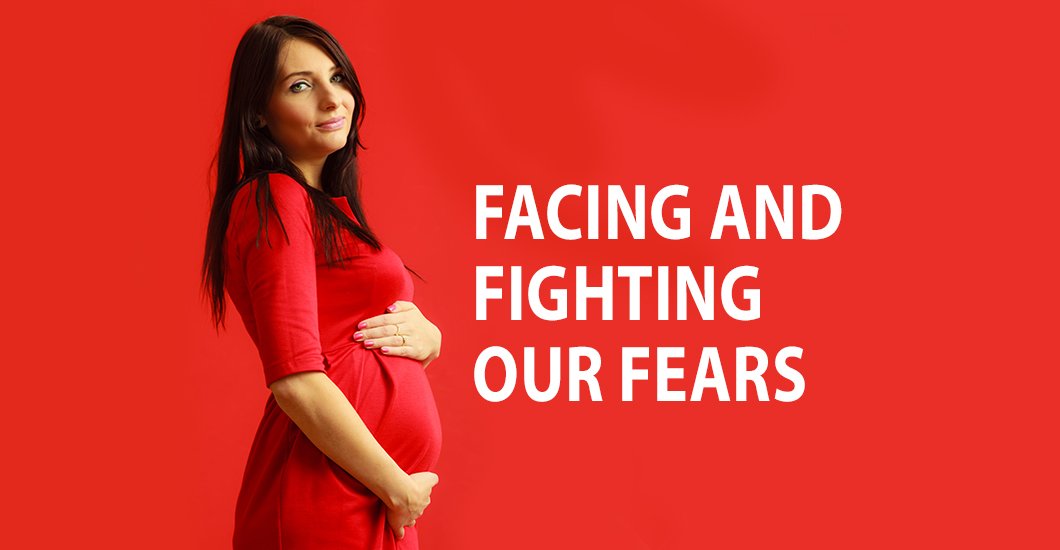
I cannot help but notice that our world today is full of fear: … of politicians and the aftermath of our presidential election; … of whether or not children will suffer, and if so, how; … of what may or may not happen; … and on and on it goes.
Of course, this list is nothing new. But as I have participated in and heard conversations among people, the prevailing emotion is this paralyzing fear. Here is an example of a conversation among friends that recently occurred:
I shared with some friends from church about our third pregnancy, and one woman’s response was, “Well, I hope this one doesn’t have anything wrong with it!” I know her and knew she meant well, but it was a blow nonetheless. Shortly following this comment, another friend (who has an autistic child) mused aloud, “It’s probably good that my daughter hasn’t married yet as she approaches 30. We have so many autistic family members that maybe God is preserving her from having a child with a disability.”
Taken aback by both statements, I realized this reality: they were statements made out of fear, not love.
Unfortunately, it is this prevalent societal mindset that undergirds how most people perceive humanity: if you are a productive, contributing member of society, then you are somehow superior to those who are not. Those with disabilities are unfortunate disappointments, burdens to bear.
I am sure both women did not intend to convey this message, but they verbalized fears that have already flitted through my mind on occasion throughout this pregnancy— the what ifs. What if our child has a disability? What if we have a miscarriage? What if something goes wrong?
As soon as the fear enters my mind, I try to quell it with scripture. Two of my favorites are “Perfect love casts out all fear” and “Trust in the Lord with all your heart and rely not on your own understanding.”
Fear can only paralyze us if we allow it to. I think the first step in overcoming our fears is to face them head on. We cannot live in denial, nor can we become catatonic or traumatized by fear and its cousin, worry. Once we face fear with truth and God’s love, then we must fight it with His word. The Lord has given us tools to combat fear so that we may live in freedom instead.
So, yes, it is true that our third baby might have something wrong with him or her, but I cannot dwell in the suffocating place of fear. I would rather dwell in the vast meadow of freedom, which means I rely on God for all things, both good and bad. I trust in the Lord, and I know that He will not fail me.
'
Why is it difficult to be the same person at work, home, church and with our friends? I have observed this problem for several years, but have lately become more aware of the challenges people have with consistently being “real.” In a few recent discussions with friends, I received blank stares and perceived a lot of discomfort when I advocated for being the same person at all times and for being transparent about our lives with others. Why is authenticity, especially Catholic authenticity, so uncomfortable?
My instincts and own experience lead me to think the root cause of this occurred for many of us at a young age. The first time we felt pressure to “fit in” with a particular group in school we began down the path of conformity that only accelerates as we grow older. In college, we may have heard from our professors (or our parents) that we need to keep work, faith and our personal lives separate. We may have feared being judged or criticized in those early jobs for sharing anything personal which only hardens into a compartmentalized mindset as we grow in our careers. I want to believe that deep down most of us desire to consistently be our real selves but do not know how to get there.
Logic should tell me that it is inevitably harmful to suppress my true self for a sustained period of time, yet many people perceive there is no other option. Do you love being a parent but feel awkward about discussing your kids at work? Do you desire to spend more time with your family but worry about speaking with your boss about this? Is your Catholic faith important to you but perceived intolerance among friends and work colleagues keeps you from discussing it? Were you ever faced with a difficult ethical or moral dilemma but remained silent or chose the easy way out rather than advocate for doing the right thing?
Obstacles to Authenticity
Let us address some of the obstacles that may prevent us from being authentic Catholics. I am making a base assumption that you agree with me on some level that authenticity is important and that many, though not all, people have a desire to be more open, transparent and authentic. Here are a few of the obstacles that prevent this from happening:
◗ There could be a lack of self-awareness. Do we even know that there is a problem?
◗ Fear of people not liking the real us; fear of not fitting in; fear of being judged; fear of persecution for our religious beliefs; fear of not moving up the career ladder if we do not fit the right corporate mold.
◗ Lack of confidence in our opinions; lack of faith in our convictions; lack of courage to defend the truth; lack of knowledge about our faith.
◗ Attachment to an income level and lifestyle that requires unhealthy compromises.
◗ Conforming to society’s march toward political correctness, universal tolerance and acceptance of things which are in direct conflict with our faith, values and principles.
◗ Relaxing our standards because it is easier to go along with the crowd than take a stand.
This list may be as painful for you to acknowledge as it is for me or you may have a different list. The questions I have been asking are unsettling but necessary if a more authentic life is to be pursued and embraced. “To be yourself in a world that is constantly trying to make you something else is the greatest accomplishment” (Ralph Waldo Emerson).
Embracing the REAL You
Have you ever replayed pivotal moments in your life and regretted your actions or words? Ever feel a twinge when your mouth said one thing and your heart/head felt another? Perhaps these feelings are your conscience trying to get your attention. It could be the Holy Spirit. Maybe, just maybe, it is time to consistently let our true selves be seen by others. But, is there an upside to having the courage to embrace who we really are?
The answer is a simple yes, because we are made for Heaven and not this place. We are here to help ourselves, our families and everyone else get to Heaven.
I am writing this article from the perspective of my Catholic faith, although I believe anyone can find value in what I am saying. As a Catholic reaching out to other Catholics, I challenge all of us (including myself) to show real courage and step up in our defense of Christ and His Church. The Church is under siege on multiple fronts and is often attacked for its unflinching defense of Christ’s teaching. We can no longer remain passive and be Catholic only at Mass on Sundays, but somebody different the rest of the week. Consider the words of Archbishop Charles Chaput in Render Unto Caesar: “Don’t lie. If we say we’re Catholic, we need to prove it. America’s public life needs people willing to stand alone, without apologies, for the truth of the Catholic faith and the common human values it defends. One person can make a difference—if that individual has a faith he or she is willing to suffer for” (page 197). We can and should make a real difference through our prayers, our voices, our writing and at the ballot box.
After you read this reflection, please prayerfully consider if you need to be more authentically Catholic. I do not know many of us, myself included, who could not stand some improvement! Let us ask the Holy Spirit to guide our actions and give us courage. Let us be joyful and set a good example for others by being unafraid to be our true selves. What is required of us is not easy, but our Lord will help us if we offer up our burdens and concerns to Him in prayer. He gave His life for us on the Cross. This sacrifice requires a faithful and courageous response from His followers.
With confidence and purpose, with our ultimate destination in mind, let us all try to be a little more authentic.
'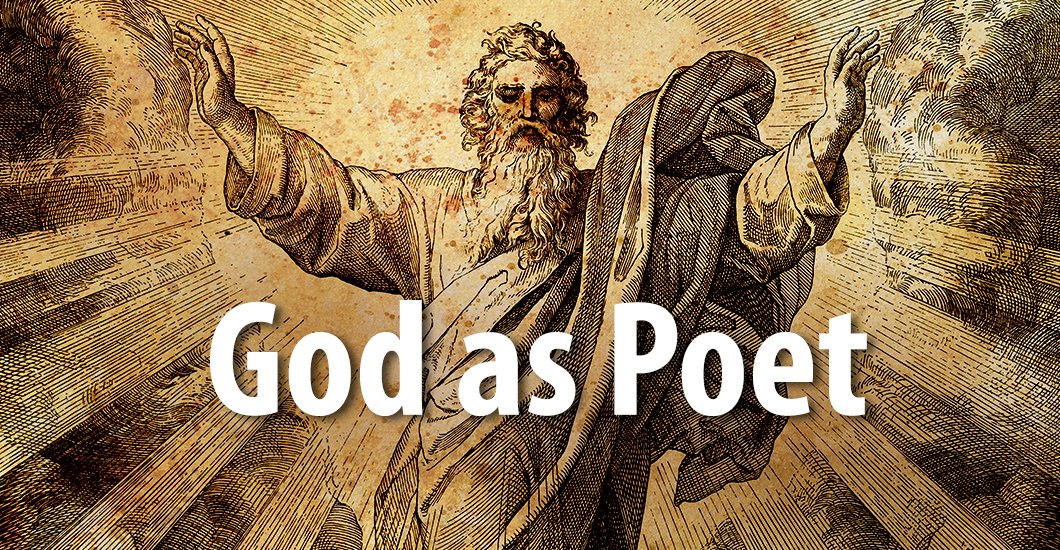
Recently, a friend wrote to me saying, “I’m skimming ‘Jesus of Nazareth’ and Pope Benedict XVI mentions all the mountains in Jesus’ life (temptation, teaching, prayer, transfiguration, etc.) and it just struck me as really poetic. Do you have any thoughts regarding God as a poet or something similar?”
Perhaps because I am a writer myself, the idea of God as a poet delights me. My first articulate thought was of course God is a poet; He is a craftsman and an artist, and we and the universe we inhabit are His great work. Something else came to mind as well and it was only in writing a response to my friend that I began to elucidate the connections:
Let me begin to reply to that question with another question: have you read the last paragraph of G.K. Chesterton’s “Orthodoxy” lately? Allow me to refresh your memory; it is one of my all-time favorite passages:
“Joy, which was the small publicity of the pagan, is the gigantic secret of the Christian. And as I close this chaotic volume I open again the strange small book from which all Christianity came; and I am again haunted by a kind of confirmation. The tremendous figure which fills the Gospels towers in this respect, as in every other, above all the thinkers whoever thought themselves tall. His pathos was natural, almost casual. The Stoics, ancient and modern, were proud of concealing their tears. He never concealed His tears; He showed them plainly on His open face at any daily sight, such as the far sight of His native city. Yet He concealed something. Solemn supermen and imperial diplomats are proud of restraining their anger. He never restrained His anger. He flung furniture down the front steps of the Temple, and asked men how they expected to escape the damnation of Hell. Yet He restrained something. I say it with reverence; there was in that shattering personality a thread that must be called shyness. There was something that He hid from all men when He went up a mountain to pray. There was something that He covered constantly by abrupt silence or impetuous isolation. There was some one thing that was too great for God to show us when He walked upon our earth; and I have sometimes fancied that it was His mirth.”
If God is a poet— and of course He is, as He is all good things—then this is the best encapsulation of how and why.
Jesus, the first and final Word, is the foundation and fulfillment of all communication. The universe and everything in it was spoken into being through and by the Word of God. The source of all poetry and all that with which poetry concerns itself is both Poet and poem and reader/audience.
Poetry is distilled, refined, artful communication. Even if the poet, speaker, message and audience are a single person—the author—it is genuine communication between parts of the self, ideas and (usually) an imagined audience. (If that sounds trinitarian, it absolutely should.) All that poets do, in their minds and in their output, is a dim reflection of the self-contained communion of the Triune God and His awesome creative process recorded in the first chapters of Genesis and the Gospel of John. Thus, Tolkien’s word for the artist’s labor: sub-creation. Like a nesting doll, our efforts to create, in our souls and in action, are within and depend on the Creation.
There are few more potent landscapes within that Creation for encountering sublimity than the mountaintop and the desert. The mountaintop and the desert are archetypical locations, liminal places in reality and imagination, intimately familiar to two very similar types of people: the artist and the mystic. Those who seek art, find God; those who seek God, find art. Art, perhaps especially poetry, is metaphorically a kind of alchemy. At one time alchemy was understood to be primarily a spiritual process: what one did with metals and physical transformations was only an aid to, and a sign of, the purification of the soul. That is an apt image for how art works, especially when one understands that the essence of art, especially poetry, is refining: as Chesterton put it, the essence of every painting is the frame—the limitation—where one draws the line. It is the cutting away and the framing that makes the art. Just so, the mountaintop and the desert are places where the world is refined, reduced, delineated: the extraneous is stripped away in the landscape, and so, in a kind of alchemy, that landscape helps strip away the extraneous in our outer and inner selves, leaving us primed, open and ready to encounter the elusive Divine.
On the mountaintop or in the desert, we leave behind the company of the world for the privacy of an intimate relationship with the ultimate Other. The thing about the poet, often more so than the mystic, is that urge to communicate which initially prompted going out and up, it is also the desire to return to the rest of the world—to bring back what one has learned and experienced and sing it out. (In the mystic, this is primarily an evangelistic urge, though art can be its fruit. Saint John of the Cross comes to mind, whereas for the poet that is reversed.) Yet even in that return and openness, there is something personal, something private, something kept to oneself, that belongs only to and within that Divine relationship. Chesterton sees that private element of the relationship between the Son and the Father as mirth.
The best poetry is, as Robert Frost so famously said, the kind where the poet learns something by writing the poem—there must be surprise. Whether a new insight, the revelation of something we did not know we knew or the fresh perspective offered by juxtaposition, I believe this surprise is the same kind of surprise that is the essence of mirth. When you examine what makes something funny, one or more of those three ways of surprise are usually at the heart of it.
We have an unfortunate cultural preconception that poets must be black-clad, brooding and always very serious; it is tied into the sharply mistaken notion that angst, unhappiness and suffering are the only worthwhile fuel of art. The concept of the funny in poetry is almost completely restricted these days to “light verse” and doggerel. We similarly conceive of the truly religious person and the mystic as grave. In secular parlance, that would be conflated with joyless and mirthless, solemn. As the world mischaracterizes happiness, it also often does not understand what lies in the depths of “solemnity.”
Here we really come down to it: joy can be painful. Joy and happiness are separate from pleasure. (Whereas the world says only pleasure is happiness). What should be equally yoked to this concept of “Catholic joy” but is often forgotten is this: that mirth can be solemn. Something serious can be very, very funny, and something that causes laughter can be weighty and awe-filled.
Jesus is the God who weeps, who rages, who suffers. Emmanuel, God-with-us, means not just that he walked the earth but that He fully shares in the human condition, save sin, of course. In Chesterton’s image of His hidden mirth, I see the sharp outline of His humanity and, veiled from our weak sight, His Godhead—the surprise of divinity, the divine surprise, the final, satisfying twist and fitting conclusion at the end of the poem. The Triune God, revealed in the person of Jesus, is and delivers the surprise, the whole picture, the final punchline, the definitive communication—the part that takes our breath away, moves us to tears and delights us.
Is God a poet? He is the Word who comes to us and goes from us, in continuous dialogue. He is the Word that seeks the mountaintop and the desert and then returns, to bring us to them and them to us. He is the Word that absolutely reveals, yet remains mysterious in His essence. He is the Word that is so beautiful it wounds us and yet, in the wounding, makes us whole.
'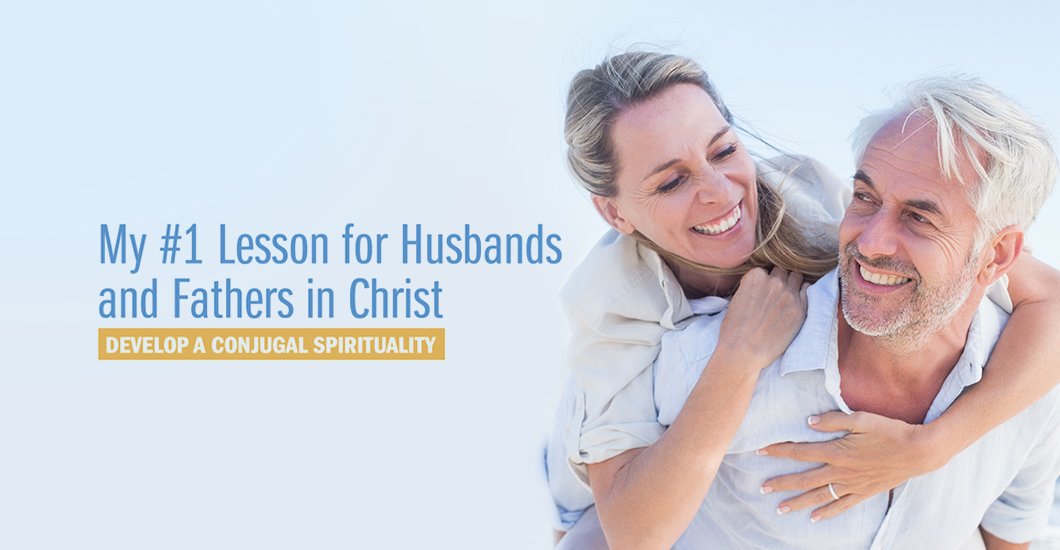
It’s Not Automatic
Kate and I have been married for just under ten years, and we currently have six children under the age of eight (four sons and two daughters). So, from the get-go our relationship has been defined by our constantly having more demanded of us than we seem to have to offer. This often drives us to prayer to ask God to make our kids (and one another) less demanding, to miraculously give us more energy, patience, and love, and to somehow get us on the same page each time fertility comes back around and we’ve got decisions to make. God is faithful, and He responds beautifully when we come to Him, so our deepest struggles usually don’t come from His lack of communication but from our own.
We had both studied and given presentations on the Theology of the Body prior to marriage, and I was proud of how we prayerfully discerned big decisions, so I expected that entering into a Sacramental union with my wife would somehow provide the grace of a sort of spiritual “mind-meld.” I realized pretty quickly that God doesn’t actually work that way, and we were both pretty quickly overwhelmed by the fact that we are completely different people, each with our own unique perspective (who knew?). It was like moving to a foreign country and expecting to naturally speak the language somehow.
I spent hours in prayer asking God to bridge the gap for us, and I was constantly nagging Kate to do the same. We would go to Adoration together, and I expected that God would provide us with a perfectly unifying experience, but it usually ended with us in the car afterward trying (and failing) to understand what the other was sharing about their own particular experience in prayer.
There was also the almost constant discernment about massive decisions having to do with openness to life, career changes, the education of our children, etc., and we didn’t feel like we had the material resources for any of it. Our foundational differences in our understanding of God and how we related to Him (especially when suffering is on the line) quickly came to the surface and seemed insurmountable. We would each get different answers in prayer, we would struggle to articulate ourselves, and we felt like we ultimately couldn’t trust each other’s discernment. After a while, we stopped wanting to even bring it up; we felt trapped within the walls that were growing between us. This division became a deep source of pain, despair, and bewilderment. If God cared about our marriage and He wanted us to be united, why didn’t He fix it?
We Don’t Make Sense By Ourselves
It was during my reflection on the Stations of the Cross one Friday during Lent that I realized where I had been going wrong. During the Fifth Station (Simon helps Jesus carry His Cross), God showed me that I was like Simon, unwilling to allow my own individual “progress” to be hindered by my wife’s struggle to trust God in the same way that I did. I was prideful of how well I thought I was carrying my crosses, and I realized that I didn’t really want to be affected by her weaknesses. I quickly recognized that if I were able to “get to the finish line” without her, it would be completely pointless. It was God who joined us, and because of that, our lonely journeys to Him no longer make sense. I realized that my life really only makes sense if I am willing to get under her cross, our cross, moving as slowly as both of us can move together. And, as it turns out, this completely changes the experience of the journey for both of us, making it so much more fulfilling and very real.
We began to see that what we were yearning for was what Saint John Paul II continually referred to as conjugal spirituality. But, we didn’t have the tools or even a vision for how to develop that. We prayed together often using the Rosary, the Liturgy of the Hours, and other devotions, and we discussed our insights and experiences, but we each still felt like outsiders to the deepest movements of one another’s heart. I realized that I could not know Kate in her truest self without coming to know who she is in the presence of God.
Simple, But Not Easy
It wasn’t until we were introduced to the Couple prayer Series, a simple program created by Deacon Bob and Kathy Ovies to get couples started in praying together, and later to Domestic Church, a movement from Poland that provides basic formation specifically for conjugal spirituality, that we began to see that developing a conjugal spirituality wasn’t a new or complicated process, but it certainly wasn’t easy. We learned, for example, that the spiritual intimacy experienced when praying together openly and out loud is truly deeper than any other form of intimacy. The vulnerability involved in even sexual intimacy still doesn’t compare to the experience of allowing our spouses to enter into our deepest prayer.
Praying together can be as simple as just holding hands and taking turns praying out loud, but there’s a reason why couples tend to avoid it. It’s not because we don’t have a few minutes to spare. The truth is, I don’t want my wife to know that I don’t have it all together and that my real prayer sounds more like a lost fourth grader than a contemplative monk. However, when we do pray together, it feels like something truly real is happening rather than the usual experience of just having ideas bounce around in my own head in hopes that God somehow hears them. And, it’s always surprising how much more quickly and powerfully the answers come for the things we pray about together. It’s as if God is saying, “This is what I’ve been waiting for! This is what I put you together for!” Individual prayer is still necessary, but it is informed by the beautifully real experience of our couple prayer.
Spiritual intimacy will most definitely strengthen and improve all other types of intimacy (especially physical intimacy—just sayin’, guys!). It can be tough to get started, but the good news is that you don’t need special techniques, you just need to do it. Hold hands and pray. It may be awkward at first, but all you have to do to get better at it is to keep doing it. pick a time each day (right before bed may not be best for one or both of you), and fight hard to stick to it, even when you fall off the wagon.
We, as men, naturally want a battle worth fighting, and we must not leave this one to our wives. They usually feel the desire for this kind of connection more than we do, but they are also deeply sensitive to the possibility of rejection if they were to ask us to pray with them. We are made to take the initiative and to pursue our wives, and there truly is no better way to do this than to actively pursue a deeper understanding of their minds and hearts as God sees them. The hardest part is agreeing to pray together and just getting started, but you’ll find that you’ll always be grateful that you did.
A few practical tips:
◗ Don’t be critical of your spouse’s prayer—this is a huge breach of vulnerability.
◗ Pick a time and stick with it. But, agree that if you haven’t done it before going to bed, you won’t go to sleep until you do. Make it a “no compromise” activity!
◗ Take turns (at least at first). Agree that you will squeeze hands or something like that to let your spouse know when you are finished.
◗ Start with thanking God for specific things—you’ll find it totally changes the attitude of the rest of your prayer.
◗ Involve Scripture (lectio divina) here and there. It gives you a great place to start your prayer.
◗ Just do it!
'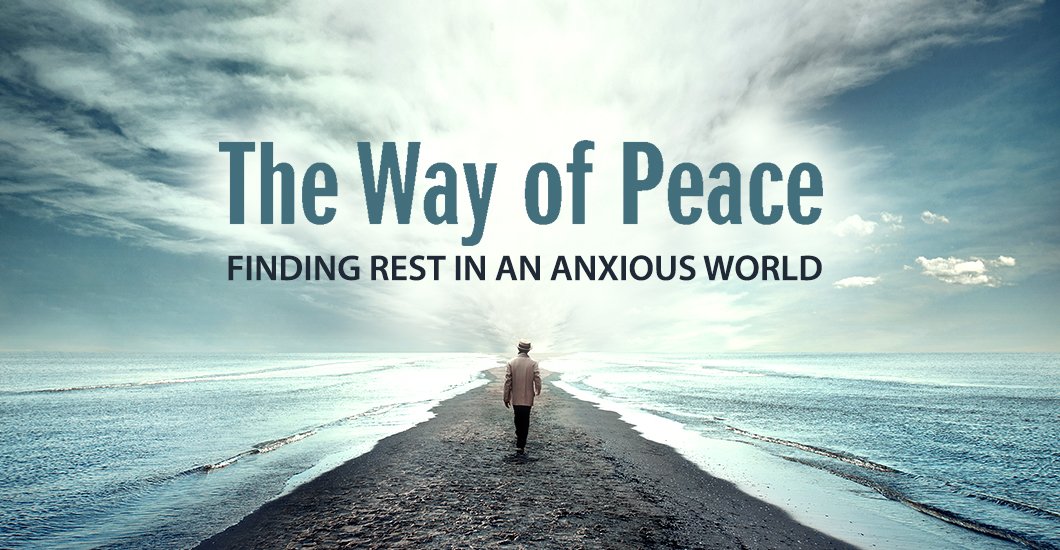
The world is in turmoil. Everywhere, people cry, “peace, peace.” But there is no peace. Our hearts are filled with anger, envy, violence, and anxiety. Every day, a tumultuous and passion-filled torrent of words and emotions gushes forth on the Internet and across cable news networks.
We long for rest, for tranquility, but cannot find it anywhere. In their desperation, some would even impose peace by force, by beating their ideological enemies into submission—a bitter paradox if there ever was one.
The upheavals of the world are not random. They are simply a reflection of the emptiness and futile strivings of our own hearts. Saint James the Apostle diagnoses the ills of our time: What causes wars, and what causes fighting among you? Is it not your passions that are at war in your members? You desire and do not have; so you kill. And you covet and cannot obtain; so you fight and wage war (James 4: 1, 2).
Our passions are running wild, and they are killing us.
Saint Paul’s Prescription
The way of the world is the way of anxiety and death, but the way of the Lord is the way of peace and life. The enemy of our souls is the one who sows enmity and hate and striving against one another. The only solution to the peace of the world is to find peace in our own hearts.
We have a natural tendency to think our own times are the worst that have ever existed. Yet, Saint Paul lived in times that were more painful than our own. His whole world was in turmoil, with the Jewish authorities persecuting the burgeoning Church, heresies invading from all sides, and wayward Christians bickering and forming factions. In these trying circumstances, Saint Paul labored tirelessly to preach the Gospel, a seemingly impossible task.
Wherever he went, he met adversity. He was relentlessly persecuted, beaten, stoned and left for dead, starved, shipwrecked, imprisoned, and maligned. If anyone had a right to be anxious and discouraged, it was Saint Paul.
But that was not his answer. Despite the literal and figurative stormy seas that he encountered, Saint Paul was always at peace. In his letter to the Philippians, Saint Paul outlines his prescription for soul peace in troubled times.
Rejoice in the Lord always. I will say it again: Rejoice! Let your gentleness be evident to all. The Lord is near. Do not be anxious about anything, but in every situation, by prayer and petition, with thanksgiving, present your requests to God. And the peace of God, which transcends all understanding, will guard your hearts and your minds in Christ Jesus.
Finally, brothers and sisters, whatever is true, whatever is noble, whatever is right, whatever is pure, whatever is lovely, whatever is admirable—if anything is excellent or praiseworthy—think about such things. Whatever you have learned or received or heard from me, or seen in me—put it into practice. And the God of peace will be with you.
Rejoice Always
The very first thing Saint Paul encourages is rejoicing. Be joyful. Let your joy shine from your face. Do not be discouraged or disheartened.
But how, you might ask, can one be joyful when there is so much pain and suffering in the world? It is often easier said than done. The answer is simply because we serve a good God who loves mankind, and He has trampled down death by His own death on the Cross. We rejoice because we know that while we are daily surrounded by defeat, we serve Jesus Christ, who defeated defeat by being defeated—and rose victorious to die no more. It is in encountering the Risen Christ, most especially in the Eucharist, that we experience the joy of His victory.
Rejoicing is not optional for the Christian. In another letter, Saint paul tell us to “give thanks in all circumstances, for this is the will of God for you.” Give thanks in all circumstances. Not by finding something positive to be happy about in the mess, though there is nothing wrong with this, but rather by giving thanks for the tribulations themselves. This is the sure way to joy and the highest form of thanksgiving. It is only possible by grace. Yet rejoicing, even in trials, is the path to peace.
Second, we are told to be gentle. Gentleness is not much valued in today’s world of swagger and machismo. Violence, both literal and rhetorical, rules the day. But it should never characterize the followers of the Crucified, who should be known for their meekness, humility, and gentleness towards all, especially those who hate us or despise us—our enemies. Do not return cursing for cursing, no matter how tempting it may be, but rather bless those who malign and persecute you and pray for them, so that you may be truly the children of God, not in word only, but in reality. peace starts with hearts full of peace, not vengeance and retribution.
The third thing Saint Paul exhorts us to is prayer. Only in opening our hearts to the Lord God will we find peace. A holy man once said, and I paraphrase, that looking for peace in external circumstances is foolish. They will never truly exist. The only peaceful place on earth is the heart when the Lord is there. It is only in communion with the prince of peace in our deepest heart that we will find the peace we so desperately crave.
And how do we come to know Christ? How do we abide in Him as the branch abides in the vine? By prayer. “pray without ceasing,” Saint Paul tells us. prayer is the tuning of the heart to God. The more we grow in the awareness of His presence, the more our hearts will be at peace.
Finally, we are told to fill our minds with what is good and true. So often, we think entertainment is harmless. We believe all the “right” things, so we imagine we can consume whatever we want. This simply is not true. In a very real sense, we commune with what we consume. It becomes part of us. Watching endless violence and debauchery on TV is not harmless. Likewise, watching a 24-hour news cycle intent on creating feelings of dread and doom and filled with all the worst humanity has to offer is a quick recipe for anxiety.
Saint Paul is clear: Do not dwell on what is evil. You are taking this knowledge into yourself and it is becoming part of you. Neither can you ever expect to find peace by filling your mind with the horrendous acts that stream across the Internet and cable news networks incessantly. Dwell on what is good and holy. Read and watch and consume what will elevate your mind and fill your heart with peace, for you will become what you gaze upon.
Earthly Problems, Heavenly Solutions
Saint Paul’s solutions are not the world’s. The world says protect yourself at all costs. Stockpile food and weapons. Scream and riot and smash things. Write scathing editorials and angry polemics. Sign petitions and intimidate. Mock and humiliate. Yet, these false cures will never bring peace—only more emptiness and pain and anxiety. They are a foretaste of hell.
The way of the Lord is the way of peace. Rejoice. Be gentle. Pray. Think on what is good. And the God of peace will be with you always.
'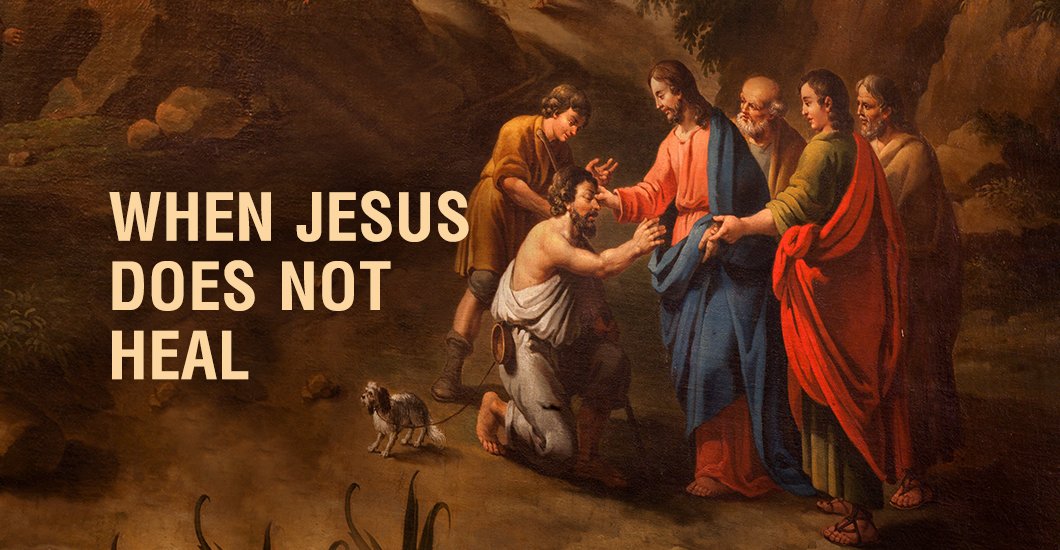
It seems like a pretty insensitive question. The disciples come across a person who had been blind from birth and ask Jesus, “Rabbi, who sinned, this man or his parents, that he was born blind?” Jesus, of course, sets them straight. This guy is not blind because he sinned. He is blind so that the work of God might be made manifest in him. And then—BOOM—Jesus heals him. Blindness, disease, misfortune—when we encounter these things it is not God sending down his wrath because we have been bad. God does not work that way. Jesus comes to bring life, to breathe healing. In this fallen and imperfect world, God allows us to experience trials and misfortune so that His work might be made manifest in us.
But what about when Jesus does not heal?
Redemptive suffering, you say. It is the correct answer, but it is not an easy one. The whole point of this Christianity thing is that the path to heaven is the cross. We will all come to Calvary. We will all suffer. Yet, because of the Cross—because of Jesus— our suffering can have meaning. Our suffering is a part of our sanctification. It is meant to be offered up to Jesus in order to “complete what is lacking in Christ’s afflictions” (Colossians 1:24).
Knowledge of this fact may not make the chemo easier or the grief hurt less, but at least, because of Jesus, we can do something with our suffering. We can give our hurt to Jesus. Not to make it hurt less, but to allow it to be used for good. Still, it is a bit difficult grappling with the fact that the same Jesus who healed the blind man sometimes allows us to continue in our blindness, our sickness or our pain without manifesting His power through a miraculous healing. Yet I also know that Jesus does not owe me anything. I know that on this side of heaven there will always be suffering. I really do not presume God to grant me miracles to reward my good behavior, and I know my struggles are not Jesus punishing me for bad behavior. Sometimes bad things just happen.
But if I am being totally honest, sometimes my “God doesn’t owe me anything” attitude has less to do with faith than it does with just not trusting God all that much. I spout off fancy, two-dollar phrases like, “Redemptive Suffering,” while on the inside, I am asking with the disciples, “Jesus, who sinned? Why did this have to happen?” After all, God causes it to rain on the righteous and the unrighteous alike? What, then, is even the point in praying? Is it all just essentially “points” and chugging along so that you can end up in the right place when you die? When my knee-jerk reaction to suffering or trials is, “Well, God doesn’t owe me anything,”
I think there is something sort of “off” in my relationship with God. The statement itself is true. God does not owe me anything. He has already given me everything and then some. Yet, God loves me with the love of the Father. When I am crushed in spirit, His response is never simply, “Well, remember, I don’t owe you anything, Mary.” It might not be in His perfect will to take my suffering away in the way that I am praying for, but it is not out of contempt or forgetfulness on God’s part that miracles appear to not come. It is out of love.
God understands my pain. He wants me to draw near to Him in times of trial, not as some kind of test of my love for Him, but because He has a plan and purpose for every moment of my life. God causes all things to work together for my good—my ultimate good, yes, but the seldom spoken truth is that my ultimate good and my immediate good are actually not in opposition to one another. I once heard a priest (I think it was Father John Riccardo) say that the only thing that is going to happen at the end of our lives/at the end of time is that the veil separating us from seeing things as they truly are will be pulled away. It will not be that we suddenly will not remember the events in our lives that caused us great pain, we will just finally see them in their fullness. We will see where God was and what He was doing in our lives’ greatest trials. We will see that God never abandoned us, not even in our weakest moments, He was drawing us closer to Himself.
We will finally see all the ways in which God has made His work manifest in us, even in those times in which it seemed He left us in our blindness. We should never tire of praying for miracles; we can be assured that God is always, always at work within us.
'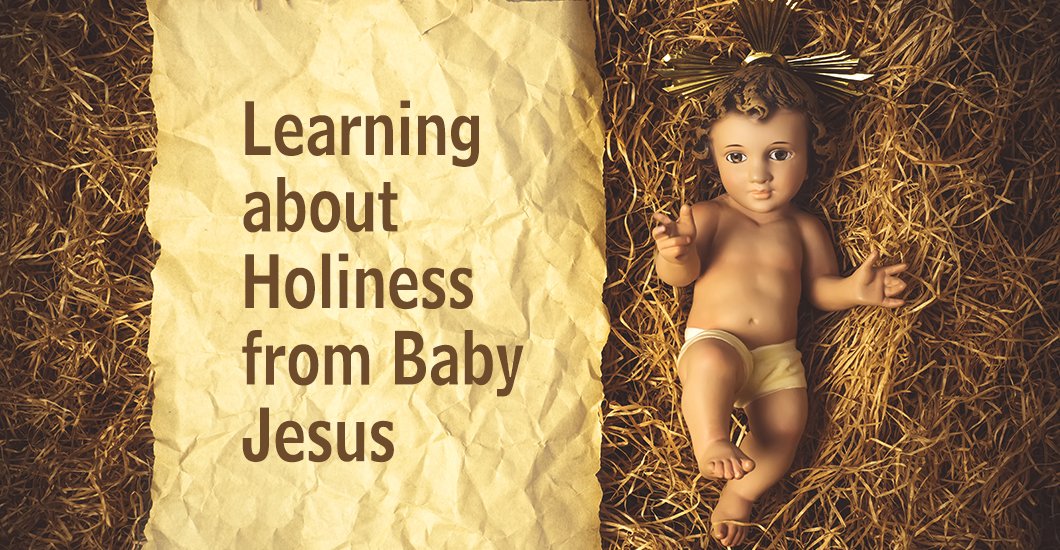
Do you know what really bugs me about Advent? Or rather, the way people approach advent? Everyone skips to the end. We are happy about the fact that Jesus was born but even then we are honoring His birth mostly in terms of how His life ended. It makes sense that we do. Freeing us from sin is the reason He came to earth in the first place, so it is understandable to want to skip to the part where He fulfills this purpose. We have all of lent for that. What is there to take out of advent?
Something that really hit me recently is that Christ’s first miracle was becoming a baby.
His First Sacrifice
He performed a lot of miracles, but the first was to become a child. He gave many sacrifices, but the first thing He sacrificed was self-sufficiency.
When I was a little kid, my two goals in life were to be an adult and to be perfect. Easy, right? I went out of my way to show my teachers and my parents that I was more than capable of taking care of everything myself. My proudest moment in kindergarten was being left in charge of a classroom of my peers at five years old. I had decided that grownups were self-sufficient, as they should be, and as such, if I wanted to be mature, I could never ask for help. From anyone. Ever.
Something I was missing was that there was a lot more to Jesus’s life prior to public ministry and death. Just like what many do with advent, I glanced over the beginning and wanted only the end. Heaven was the goal, but I forgot that the journey still happens on earth.
Jumping to the End
I wanted to be like the saints who so often seem strong and tough, ready to die a martyr for God. I wanted to make the biggest sacrifices and fight the roughest battles. Though I had good intentions, this quickly turned into an intense fear of needing people. I told myself that things like friendship and love were luxuries, so I hardly needed them; I could accomplish more and be stronger with independence. Slowly but surely, I began pushing things down, believing this was a necessary sacrifice to make in order to be who God wanted me to be.
But I could not sustain it. Eventually, this strategy of mine began to crumble as the secrets and unexpressed emotions piled up and up until they burst. When they finally did, I found myself on my knees, sobbing to God, begging Him to help me. I needed my Father.
Since that prayer, God has been slowly teaching me that it is okay to be vulnerable sometimes and it is okay to need help. Even so, I still fall into the old trap. I look at the cross and I want so badly to emulate Him right now that I put the weight of the world on my shoulders. Four years after that desperate prayer, I found myself on my knees again, this time filled with anxiety and crying to God that I cannot do it—I cannot be holy, I cannot be like Him. In my mind, I replay all the times I failed. All the times I had been selfish. All the times I had snapped at my friends. All the times I had sinned.
I wanted to spread joy, but sometimes I needed help with my own problems. I wanted to be kind, but I still snapped at people. One day I could not imagine putting anything before heaven and the next I spent hours preoccupied with temptations. One day I thought I would never waver and the next it took an hour to convince myself to pray. I believed that God had a plan for me, but the plan was too unattainable; I was never going to get it right. Inevitably, I would let Him down.
Awaiting Baby Jesus
Then I thought of Baby Jesus—long before His miracle working, long before His preaching, long before His passion, He chose what His first act would be and He chose to become a child, a child that would need to slowly grow up, nurtured by the love of His family. Christ did not jump straight to the Passion, so why do I? I might not be holy enough to die for Him but, fortunately, He gave me a much more attainable first step.
I remember to go back to the beginning and always start with the first step. Who I am can be pretty messy and, yes, vulnerable, but that is who God made me to be. If vulnerable is where Jesus started, then it is a pretty great starting place for me.
'
In our society, where individualism and our own happiness have been regarded as utmost priority, there is great emphasis placed on what makes us momentarily feel good. We are quick to avoid the situations that disturb our inner peace, upset our schedule and call us out of our comfort zone. Even in our relationships we grumble, resist and distance ourselves from those whom are most difficult to deal.
I pause here for an honest confession … Lately, I have chosen the path of feeling annoyed and complaining. Faced with a seemingly unchanging resistance from others to my own desire to be joyful, I decided it best to create some distance, a mini retreat of sorts. I recognized that I needed a break in order to get a bit of perspective. In taking this opportunity to go out into the wilderness to spend some alone time in prayer and to reflect on what is being asked of me, I now have a better understanding of what Christ desires. First, I realize I cannot remain on permanent retreat from all that I feel attempts to steal my joy. Obvious exemptions would be situations that are physically or mentally abusive. Yet, what I am talking about are difficult people or particularly trying situations that continually test my patience and call for regular forgiveness.
Case in point:
- The “one way or no way” attitude: The phone rings and I notice the caller id. As the conversation ensues I am struck by the familiarity of the questions and topics of discussion. Can we ever go deeper? No, not if it remains a one-sided barrage of questions where there is only one answer desired. No, not if there is not active listening, appreciation of the other person and a desire to have true dialogue. So, I listen and leave the discussion wondering why I spent my time this way.
- The “blinking red light”: Here is the person that is constantly in hot water. If the issue does not involve him/her directly he/she feels it necessary to stir the waters that potentially create a tempest situation. Oh, did you have plans today? Well, this is far more important and if you were not concerned before you should be by now. So, I listen, offer advice, help where I can and spend the day praying that he/she finds peace.
At times, I have selfishly asked God, “Why have you placed these rocks in my path, why am I being asked to deal with stubbornness and anxiety?” His answer, “Elizabeth, because you have yet to learn the incredible lessons of love and forgiveness that I have been so desperately seeking to instill in you! Do you honestly think that you are without fault, malleable, secure in my loving plan and accepting of all that I am calling you to be?”
“No, Father, I have much to learn. Yet, I am desperately trying to understand. Isn’t that good?” “Yes, but you cannot get comfortable with where you are, because I am asking so much more of you. Each of My children has a purpose and a journey. Sometimes this journey leads others to learn from you and other times their purpose is to challenge you to grow.”
I have choices in how I encounter others. If my life is not rooted in love, patience and forgiveness, how are others to truly know Christ through me? Moreover, our lives are meant to be proof of God’s deep call to a new life, faith that though times get difficult there is hope that our loving Father is working all for good. This in-breaking of the kingdom of God is not merely an inner journey or a futuristic promise of heaven, it begins with me today.
'
Recently, my five year old announced that he wanted a different haircut. The minimalist, efficient buzz-cut given to him by his mother was no longer sufficient. He instead wanted a longer, more shapely cut so he could wear his hair like mine.
Around the same time, my four year old announced he was hopeful that he could grow a beard like me soon. While poorly attempting to conceal my laughter, I assured him it was unlikely for a four year old to grow a beard, but left him with the hope that someday he might be capable of growing one.
A Father’s Attraction
As a father, I am always astonished at how much power I wield over the lives of my young boys. It is not so much a power of command or control as it is a power of attraction. Frankly, it never occurred to me that my haircut or facial hair was desirable for a little boy, or that either of them was paying attention to my grooming habits. Yet, they want to be like me. I am the pattern they follow, the model they imitate. They watch with careful observation everything I say and do; what I wear, how I treat others, where I spend my time, how I pray and how I treat my wife.
It is no use telling them to be kind and compassionate if I am cruel or insensitive. It is no use telling them to share and be generous if I am selfish and greedy. It is no use telling them to love and serve God if I barely pay attention to Him myself. What I do, they will do, no matter what I teach them or what they hear from others.
The Best Catechesis
When we think of catechesis, we often think of catechism classes or parish programs. While these have their place and value, children learn far more by watching and listening to the ordinary choices and patterns of life than they do by formal training. Our habits and behaviors as parents comprise a catechesis all their own and everything we say or do is shaping, to a large degree, who our children become. If we say our faith is important and yet we skip Mass for a football game it sends important signals to our children about what is really important in life. If we tell our children they should be pure and chaste and then we spend our free time watching entertainment filled with sexual immorality, it catechizes our children on what is morally acceptable. If we teach them we should love others, but we are much more interested in our phone or the show on TV than in them, they will learn from this.
As fathers, we must assess our priorities. How do spend our time, our money and our energy. In what do we invest? What do we say yes and no to in our personal lives? With every choice we make, we are catechizing our children about what is important. We can say all the right things and teach them the catechism, the commandments and the precepts of the church, but it will not matter if we do not live these truths ourselves. Live them we must. The greatest legacy a father can leave his children is a life well lived.
Live Well
Fathers, our example is a catechesis that will last a lifetime, for good or ill. Realize that your children love you. They look up to you. They want, in a very real way, to be you. You are their model. You are their guide. You are their chief educator. What will you do with this great power?
'
I will never forget one particular high-school youth group I attended where the minister was preaching on why you should not have sex before marriage. To make his point, he took out a piece of gum and started chewing. After a few moments, he spat the chewed gum into one hand, held out the fresh piece in his other hand and asked us, “Which piece would you rather have?”
The chewed piece of gum was meant to represent someone who had slept around; the fresh piece was someone who had saved sex for marriage. There is just one problem—you are not a piece of gum. The thing I hate about this analogy is that it implies that if you have gotten sexually intimate with someone before marriage, you are somehow worth less. But that is simply not true.
One of my favorite stories in the Bible is John 8:1-11. In this passage, a group of Jewish religious leaders want to kill a woman who was caught committing sexual sin. They take her to Jesus and ask Him whether He thinks she should be stoned to death.
To the religious leaders, this girl is worthless. She is the piece of chewed gum. As far as they are concerned, the only thing this girl is good for is to prove a point about divine justice.
So, what does Jesus do? He calls out the religious leaders for treating this girl like she is nothing. He reminds them that every single one of them has screwed up at some point. His reply is, “Let anyone among you who is without sin be the first to throw a stone at her.” One by one, they drop their stones and leave. When Jesus and the woman are alone, He turns to her and says, “Neither do I condemn you. Go, and from now on do not sin again.”
If you want to start over, God is not going to be up there thinking “Ha! You sinned! Off to Hell you go!” God is going to be thinking the same thing that God was thinking thousands of years ago, “Fear not, for I have redeemed you; I have called you by name, you are mine” (Isaiah 43:1). God does not love us more when we are being good and less when we are not. God just loves us—unconditionally and always.
Often, though, the biggest barrier to starting over can be forgiving ourselves. Because past mistakes can be the source of a lot of pain, we generally do one of two things. We play them over and over again, obsessing on all the things that we could have done differently, or we try to sweep the memories under a mental rug and completely forget about them. Thinking about your mistakes to a certain extent is important, but only because you need to understand why it happened so that you do not make the same mistake twice. Beyond that, do not beat yourself up about the past. The most important day to Jesus is today.
Also, know that forgiveness is not a feeling. When you start over, you might not necessarily feel forgiven. The reality is that the pain of past mistakes will probably take a while to heal. But remember that the past is gone. God does not condemn you for it and you should not condemn yourself for it. You might have to tell yourself that you are forgiven 100 times the first day and the second day, but on the third day it will be a little less and even less each day thereafter. Until one day, you will be able to accept that you have been completely forgiven.
So, I think we need a new analogy. While every analogy is going to have its limitations, one I really like is the $100 bill. If I had a $100 bill, I could crumple it up, I could stomp on it, I could pass it round an auditorium filled with people, but at the end of the day, it would not be worth any less. It is still going to be worth $100. If you have gone through your fair share of mistakes and heartbreaks, do not ever believe you are worthless—and do not ever believe you cannot begin anew.
'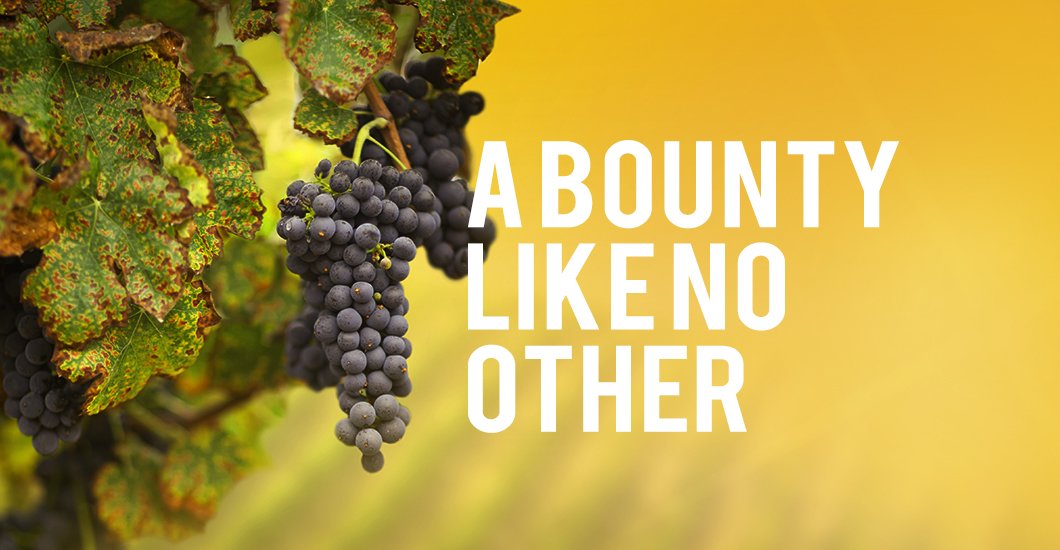
Saint Matthew’s Gospel, of the four Gospels, alone uses this particular verse in telling of the Parable of the Wicked Tenants:
“Therefore I say to you, the kingdom of God will be taken away from you and given to a people, producing the fruit of it” (Matthew 21:43).
The Navarre Bible explains this verse should, “fill the faithful with hope and a sense of security.” Although all may seem lost, the vineyard owner, God, remains in control of the vineyard. With these words, Jesus assures anyone aiming to bring glory to God a place in the vineyard.
Jesus encourages the faithful to remain hopeful, no matter how rejected they feel in this world. Rejection does not indicate defeat; instead, He encourages with the words:
“‘The stone which the builders rejected has become the chief corner stone …” (Matthew 21:42).
Jesus is the cornerstone rejected, crucified and raised to become the foundation of the Church. Rejected like no other, He produced a bounty like no other. It is the grace of that vineyard He longs to share with the faithful.
The “wicked tenants” tended a vineyard carefully fashioned by the land owner. A vineyard was created to profit not only the vine growers but also the beneficiaries of the bounty. God has provided each of us with our own perfectly constructed vineyard. How can we offer back to God what He has given us? How can we be “the vine growers who will pay Him the proceeds at the proper seasons” (Matthew 21:41). Primarily, we accomplish this by sharing the good news and loving others.
We can begin with our families. The only experience with Christ some of your family and friends may have is how they meet Him in you. We may experience painful rejection for our faith. That does not excuse us from the charge to be Christ in the world and to share the grace of what we believe. People may not wish to hear our words, but as the old hymn reminds us, “They will know we are Christians by our love.”
Another way to share the vineyard’s yield is through invitation. Consider hosting a weekly small group in your home or at your parish. Trust me, a vineyard filled with eager tenants longing to follow and please the land owner is always a great blessing. My entire reversion to the Catholic Church began with one such invitation. A woman at my parish reached out and asked me to join her small group of faith sharing.
I remember the night the group met for the first time. Most in attendance had never participated in a book club, never mind a “religious book club.” To overcome my nerves, I convinced myself this would be my only night. However, after the host served the yummy snacks, I knew I would be back for another week. Week after week, I learned a little more about the Scriptures and Jesus’ great love for me. Eventually, it was much more than the snacks which attracted me to the group—it was the accountability, the fellowship and the blossoming of my faith. I soon began to arrive with a journal and a Bible, complete with handy dandy tabs to assist me in finding scripture passages.
Ten years later, I now host a weekly small group. We have read countless inspiring Catholic books and Bible studies. We have shared countless yummy snacks, cups of coffee and, yes, even glasses of wine. The small group meetings, like the promise in Matthew 21:43, help us to be hopeful and maintain a sense of security.
The truths of this parable remain: an allegory about a carefully constructed vineyard intended to produce bountiful fruit yet misused for selfish desires, along with a rejection of the land owner’s authority. We may feel the wicked tenants have won, but instead, we find comfort in Jesus’ words from Saint Matthew’s Gospel. In the end, the vineyard belongs to those who labor, even in the most imperfect ways, to accomplish God’s will.
What joy I have discovered in my small group as we share common struggles of faith. Buoyed by our friends on those days we may feel we labor in vain, our efforts themselves please God. How it gives us a sense of security to know we are not the only one seeking to know God and His will better and to share in the hope that we will be the vine growers with whom God will choose to share the vineyard.
'